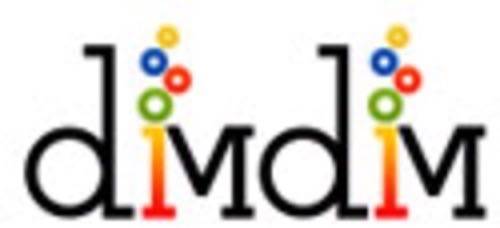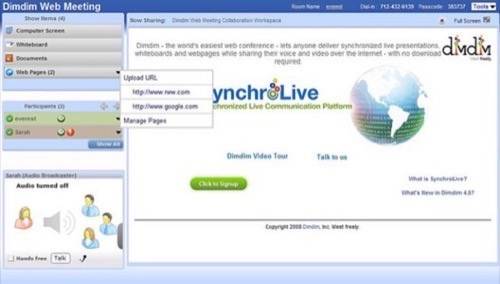Dimdim, the easy-to-use web conferencing tool that delivers live presentations, whiteboards, voice and video, has just exited their beta period today. With the exit, the service has also added features like co-browsing and their new SynchroLive Communication Platform which automatically scales performance. The feature which you might be the most excited about, though, is Dimdim’s decision to release their source code.

The New Platform
With the new SynchroLive Communication platform, the service is now more scalable while keeping all live communications synchronized, no matter whether you’re sharing audio, video, files, or web pages. This was one of the areas where Dimdim stumbled in the past. When we used it here at RWW for sharing our desktop with our readers during our testing of Chrome, the audio and video weren’t matching up. That problem is, supposedly, no more. (We’ll have to do another live demo and find out!) Says the company, the platform now makes it possible for five audio streams to be recorded, where before Dimdim only supported recording one.
The platform also allows for the new co-browsing feature to work. With this, a presenter can share their web browser with viewers who can then also be made presenters in order to browse along with the original presenter. The co-browsing allows for scrolling up and down, but does not track mouse movements, so it is not as good for using your mouse to point to an element of a web page. However, when you just want to share material on the web with a group – say, for example, a professor teaching remote students, it would be a good solution.

Open Source Dimdim, “Liberty”
Also launched today with the release of Dimdim 4.5 is the launch of “Liberty,” the Open Source Community Edition of the new commercial hosted version. Liberty’s complete source code will be made available under a GPL3 license with no limit to the number of attendees, meetings, or mashups that can be created. Liberty is also available as a downloadable VMWare Virtual Appliance.
The Open Source version also integrates with other web applications, including:
- Zimbra: Dimdim now offers a free zimlet for Zimbra’s open source email system;
- Moodle: Dimdim is integrated with version 1.9 of Moodle’s Course Management System;
- SugarCRM: Dimdim is integrated with the leading open source customer relationship management system,
- Claroline: Dimdim is embedded within with the collaborative learning environment.
More Enhancements
Those who have used Dimdim in the past will notice some subtle UI changes in the newest version including a smaller top frame and revamped menus on the left. Drop-down arrows have been added to those menus for easy access to files and shared web pages, too.
In the future, Dimdim will also allow for skinning changes and templates. Because Dimdim’s service-oriented architecture is composed of a handful of different services (screen sharing, audio streaming, video, etc.), the platform makes it possible to use customize the look and feel of the Dimdim interface and create a template just for your needs. If you’re only sharing web browsers, for example, you could turn all the other features off. The templates created by Dimdim users could then be shared with each other. Dimdim says these new features will be available sometime early next year.
In addition to the no-cost Open Source version, Dimdim will continue to offer a free version for meetings with 20 or fewer people. Dimdim Pro 4.5 starts at $99 per year for unlimited meetings plus video chat.

















